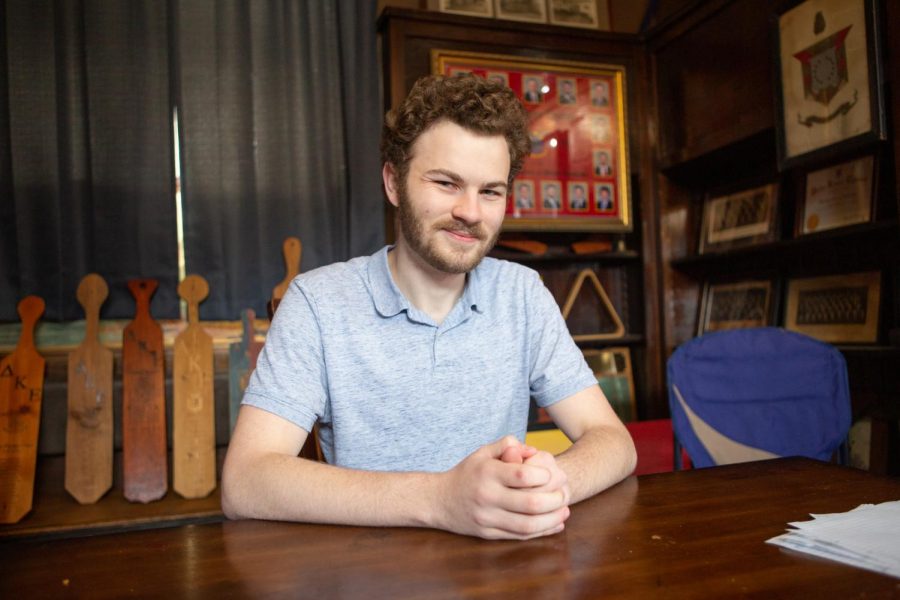Socially stagnant semester leaves some students in ‘disaster mode’
Junior Collin Follin poses for a photo at a table in his house on Wednesday afternoon. Follin has struggled with adapting to online classes this semester.
October 29, 2020
Connor Follin, a junior in Business, is exhausted. He bombed his recent virtually proctored finance midterm.
But this year, it was far harder to reach out to his peers. Sitting behind a screen, staring at countless black tiles, he could sense the lack of productivity that would come out of yet another silent Zoom breakout room.
Not only did he feel hesitant to reach out to his classmates, but he felt his professors had not provided sufficient guidance nor structure to their classes.
Fatigued and distraught following the exam, he finally talked to other students. His feelings resonated with them.
This semester, and year, has brought unprecedented hardships for students, ranging from severe loneliness from lack of socialization to extreme frustration being unable to grasp course material on their own because of online schooling. This new learning environment has led to an influx of students struggling with their mental health.
Get The Daily Illini in your inbox!
“All the days are so similar now because it’s wake up, sit at your computer, go to sleep,” Follin said.
To make matters worse, students have a hard time even reaching out to express these concerns with fellow peers, family members, professors and mental health professionals.
With the semester being half-way completed, some students have become accustomed to the virtual educational structure, but even more students continue to internalize fears pertaining to different aspects of their lives that ultimately affect their overall well-being.
Follin talks about his excitement at the beginning of the semester regarding coming back and seeing his friends again. At this point in time, however, he states that those positive emotions have diminished, and his mental health has been on the decline.
He highlights his peers’ sentiments as well, saying that they agree that they’ve “socially stagnated.”
Seeing the same faces day-in and day-out causes boredom even for Follin, who resides with his Delta Kappa Epsilon brothers. His boredom has reached the point where he’ll find any excuse to leave his house.
“If someone tells me they’re going to the grocery store, I just tag along,” he said.
Additionally, online classes are difficult to manage. While he normally enjoys working with classmates, he says that the anxiety that had “lulled out” his freshman year is starting to resurface.
This time around, people are refusing to participate in class, especially in 150-plus person lectures. “The pressure to not raise your hand is stronger than the pressure to raise your hand,” he adds.
“With in-person, some pros are having more social contact,” he said. “You can turn to someone, and you can be like, ‘Hey, can you repeat what he said?’ or ‘What did you get?’”
“Being able to have the accessibility to the lecture afterwards” is one of the only pros of online classes. “In-person, you can’t pause the lecture if you miss it. You can’t go back.”
The burdens, however, seem to be weighing him and other students down more heavily than the pros are uplifting them.
Generally, students’ feelings are often fluctuating, and there are times when students even convince themselves that they are doing better than they were pre-COVID.
Professor Tara Powell from the Department of Social Work described the different stages people may experience after a pandemic hits. She cites Zunin and Myers’ Phases of Disaster, explaining that following a disaster, individuals undergo a mixture of emotions. While one might assume that people would simply grieve, there are actually “emotional highs” too.
Dr. Powell gave the example of Hurricane Katrina and expanded on the reconstruction phase. We are soon entering this phase.
Post-Katrina, she says that people were able to recover in a different manner than they are able to through COVID because it was a “one-time event.” In both cases — following any disaster — people are essentially forced to go beyond the initial shock phase, and then face the challenge of adjusting head-on.
“Generally, before a disaster, communities and individuals are really doing okay,” she added. “And then there’s this pre-disaster period, there’s this warning, and there’s this threat that causes a little bit of anxiety, heightened insecurity, uncertainty about what’s going to happen.”
She references the disaster as “the impact.” In this case, the impact is the disease running rampant, infecting millions throughout the world. She says that “we start to experience more emotional lows. But after the impact, what you’ll see is that our emotional highs go way up.”
The reason these emotional highs take place is that people realize that the situation could not have been avoided. Thus, naturally, people are offered a new perspective and begin to turn the cons into pros.
Professor Karen Tabb Dina, also from the School of Social Work, agreed that populations endure “collective trauma” as they fight disease and mental illnesses. Powell elaborates on the topic of collective trauma, saying, “Major depression rates, for example, went up 7%. There’s also an annual stress survey that’s done among U.S. adults, and what it found is that stress levels have significantly increased since the pandemic began.”
University students certainly share the same trauma, especially without the opportunity to see family as much for moral support, out of fear of passing on or contracting the disease.
Tabb Dina says that the “excessive burden loss” people are currently experiencing due to COVID “is compounded with fear.”
Follin said that while some professors offer extra help, some don’t. For the most part, students are not face-to-face with professors, which means they have to go out of their way for academic help.
Powell recommends for educators and family members to set the foundation of a strong support system by extending their compassion. She and Tabb Dina urge anyone who notices students’ mental health severely decline to refer them to mental health professionals if they are in danger to themselves or someone else.







